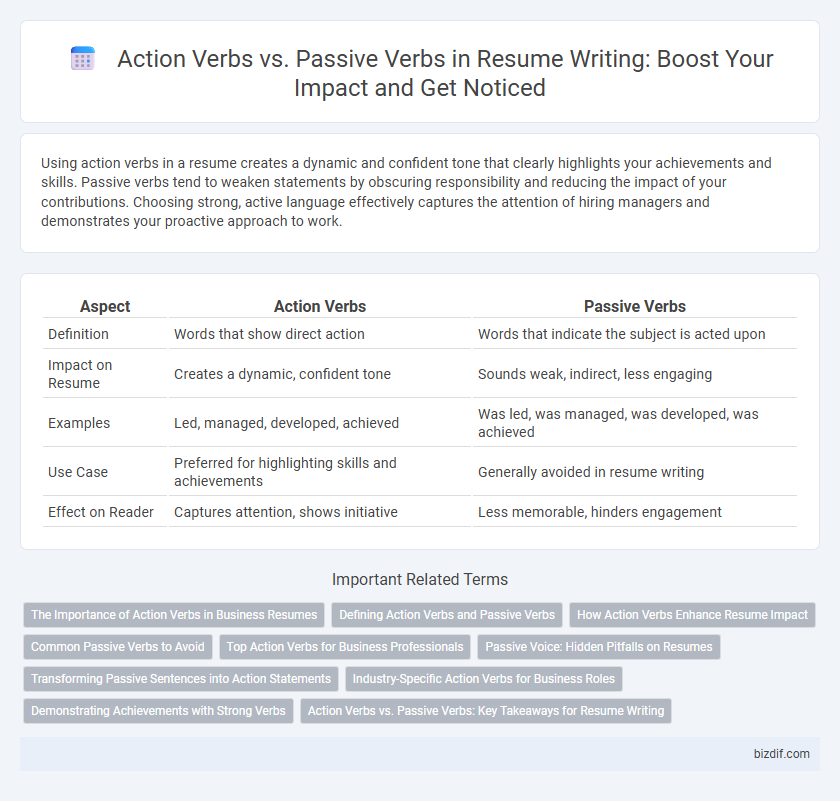Using action verbs in a resume creates a dynamic and confident tone that clearly highlights your achievements and skills. Passive verbs tend to weaken statements by obscuring responsibility and reducing the impact of your contributions. Choosing strong, active language effectively captures the attention of hiring managers and demonstrates your proactive approach to work.
Table of Comparison
| Aspect | Action Verbs | Passive Verbs |
|---|---|---|
| Definition | Words that show direct action | Words that indicate the subject is acted upon |
| Impact on Resume | Creates a dynamic, confident tone | Sounds weak, indirect, less engaging |
| Examples | Led, managed, developed, achieved | Was led, was managed, was developed, was achieved |
| Use Case | Preferred for highlighting skills and achievements | Generally avoided in resume writing |
| Effect on Reader | Captures attention, shows initiative | Less memorable, hinders engagement |
The Importance of Action Verbs in Business Resumes
Action verbs in business resumes demonstrate initiative, leadership, and measurable achievements, making candidates stand out to hiring managers. Using strong, active verbs like "initiated," "managed," and "achieved" clearly communicates skills and accomplishments, enhancing resume impact. Passive verbs can obscure responsibility, reducing the perceived confidence and effectiveness of the applicant.
Defining Action Verbs and Passive Verbs
Action verbs are dynamic words that clearly describe specific tasks performed by the resume owner, such as "managed," "developed," or "implemented," highlighting proactive contributions. Passive verbs, like "was managed" or "were developed," conceal the subject performing the action and often reduce the impact of accomplishments. Using action verbs in resumes enhances clarity and emphasizes responsibility, making the candidate's skills and achievements more compelling to recruiters.
How Action Verbs Enhance Resume Impact
Action verbs energize resumes by clearly demonstrating accomplishments and responsibilities, making experiences more dynamic and engaging for hiring managers. They emphasize proactive contributions and measurable results, which help applicants stand out in competitive job markets. Using verbs like "managed," "developed," or "led" increases clarity and impact, fostering a stronger impression of capability and initiative.
Common Passive Verbs to Avoid
Common passive verbs to avoid in resume writing include "was," "were," "is," "are," "been," and "being" because they weaken the impact of your achievements. Using passive constructions such as "was responsible for" or "was involved in" dilutes your active role and reduces clarity. Replacing passive verbs with strong action verbs like "managed," "led," or "developed" enhances the resume's effectiveness by clearly demonstrating your contributions and skills.
Top Action Verbs for Business Professionals
Top action verbs for business professionals, such as "led," "strategized," and "executed," effectively demonstrate initiative and impact on a resume. Using active verbs highlights accomplishments and clarifies responsibilities, making the candidate's contributions more dynamic and measurable. Passive verbs often dilute achievements and should be replaced to create stronger, more compelling statements that attract employer attention.
Passive Voice: Hidden Pitfalls on Resumes
Using passive voice in resumes often obscures achievements and diminishes the impact of accomplishments by focusing on actions received rather than actions taken. Employers prefer active verbs such as "managed," "led," or "implemented" because they clearly highlight the candidate's contributions and initiative. Passive constructions like "was responsible for" or "tasks were completed" weaken the statement's effectiveness and can cause key skills to be overlooked during applicant screening.
Transforming Passive Sentences into Action Statements
Transforming passive sentences into action statements significantly enhances the impact of a resume by showcasing achievements through dynamic verbs like "led," "developed," or "implemented." Action verbs clearly communicate responsibility and proactivity, increasing the chances of catching recruiters' attention and improving keyword optimization for applicant tracking systems (ATS). Using active voice also strengthens clarity and conciseness, making your contributions more memorable and quantifiable.
Industry-Specific Action Verbs for Business Roles
Industry-specific action verbs such as "analyzed," "negotiated," and "streamlined" effectively demonstrate initiative and expertise in business roles, making resumes more compelling and targeted. These verbs highlight active contributions and measurable achievements, contrasting with passive verbs that can dilute the impact of responsibilities listed. Incorporating precise, role-relevant action verbs improves candidate visibility in applicant tracking systems and resonates with hiring managers seeking dynamic professionals.
Demonstrating Achievements with Strong Verbs
Using strong action verbs such as "directed," "implemented," and "achieved" in resume writing effectively demonstrates accomplishments and leadership. Passive verbs weaken the impact and obscure responsibility, making achievements less compelling to hiring managers. Highlighting results with clear, active language improves readability and creates a powerful impression of capability and initiative.
Action Verbs vs. Passive Verbs: Key Takeaways for Resume Writing
Action verbs enhance resumes by showcasing proactivity and measurable achievements, such as "led," "developed," or "implemented," which demonstrate active contributions and leadership. Passive verbs often obscure responsibility and impact, weakening resume effectiveness and making accomplishments less clear to recruiters. Prioritizing strong action verbs creates dynamic, results-oriented narratives that improve resume visibility and engagement in applicant tracking systems (ATS).
Action verbs vs Passive verbs Infographic

 bizdif.com
bizdif.com